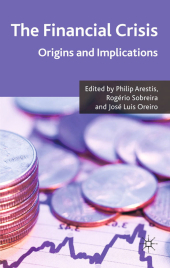 Neuerscheinungen 2011Stand: 2020-01-07 |
Schnellsuche
ISBN/Stichwort/Autor
|
Herderstraße 10
10625 Berlin
Tel.: 030 315 714 16
Fax 030 315 714 14
info@buchspektrum.de |

Philip Arestis, José Luis Oreiro, Rogerio Sobreira
(Beteiligte)
The Financial Crisis
Origins and Implications
Herausgegeben von Arestis, P.; Sobreira, R.; Oreiro, José Luis
1st ed. 2011. 2011. xiii, 268 S. 235 mm
Verlag/Jahr: SPRINGER PALGRAVE MACMILLAN; PALGRAVE MACMILLAN UK 2011
ISBN: 1-349-32267-9 (1349322679)
Neue ISBN: 978-1-349-32267-1 (9781349322671)
Preis und Lieferzeit: Bitte klicken
The 2008 financial crisis poses three fundamental questions for economists and policy makers; understanding the origins of the crisis, understanding the consequences of this crisis for the world economy, and finally understanding why the 2008 financial crisis is not as serious as the 1929 crisis. The prevailing view is that the 2008 financial crisis was solely the result of inadequate financial regulation together with a very loose monetary policy conducted by central banks, especially the Fed. It is believed that this crisis is a temporary detour in the normal course of the events, so that in the near future capitalist economies will resume the high growth path observed before the crisis. In terms of the third question, there is a widespread view that the fundamental reason that explains the avoidance of the harmful experiences of 1929 was the fiscal and monetary policy expansions in developed countries. No important role is assigned to developing countries in terms of the effects of the financial crisis.
This book challenges the prevailing orthodoxy surrounding the origins and the consequences of the 2008 financial crisis. The book demonstrates that measures in addition to a profound change in the financial regulation are required if a new financial crisis is to be avoided in the future, measures include: a change in the conduct of economic policy; a reform of the national and international monetary systems; and a radical change in the pattern of income distribution.
This book is essential reading for all interested in macroeconomics, monetary policy, development economics and the global impact of the financial crisis.
Introduction The Lessons from the Current Crisis for Macro-theory and Policy The Conventional Views of the Global Crisis: A Critical Assessment The Global Crisis and the Governance of Power in Finance Income distribution and borrowing. Growth and financial balances in the U.S. economy Re-structuring the financial sector to reduce its burden on the economy Regulate Financial Systems, or Financial Institutions? Institutional Investment and Financial Regulation: An International Comparison Rethinking the Lending of Last Resort Function: A Historical and Contemporary Perspective The Necessity of Reforming the International Monetary System Neoliberalism, Income Distribution and the Causes of the Crisis
EMILIANO BRANCACCIO University of Sannio, Italy GERMANA CORRADO University of Rome, Italy GARY DYMSKI University of California, US FERNANDO FERRARI-FILHO Federal University of Rio Grande do Sul, Brazil GIUSEPPE FONTANA University of Leeds, UK ELIAS KARAKITSOS Guildhall Asset Management, UK COSTAS LAPAVITSAS University of London, UK MALCOLM SAWYER University of Leeds, UK ENGELBERT STOCKHAMMER Kingston University, UK GENNARO ZEZZA University of Cassino, Italy


